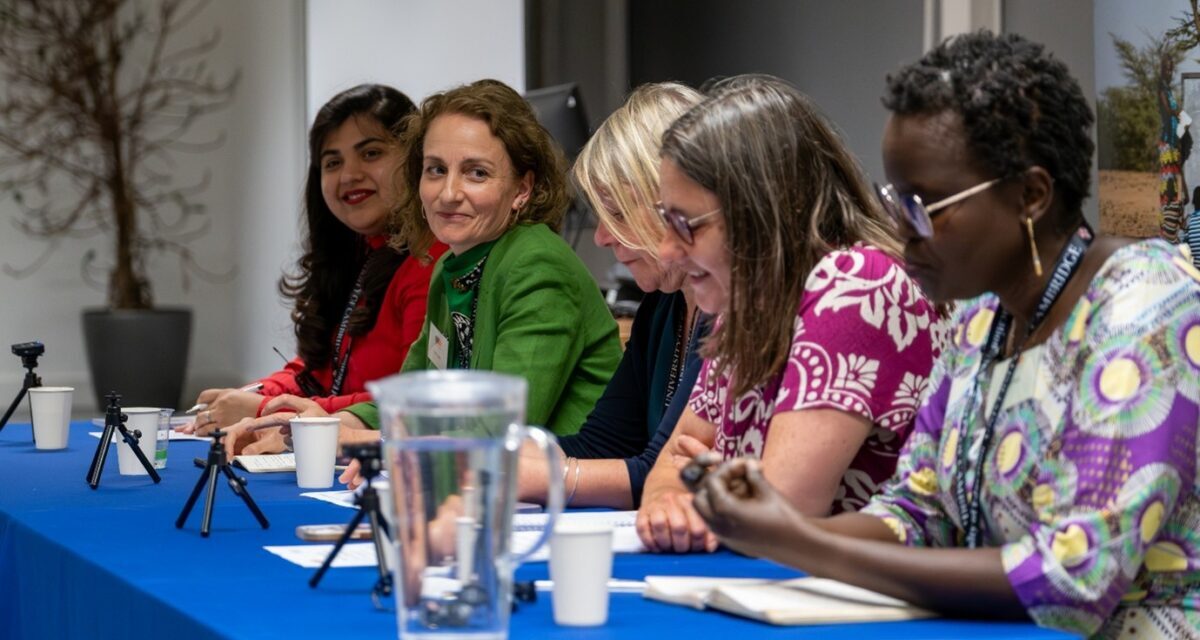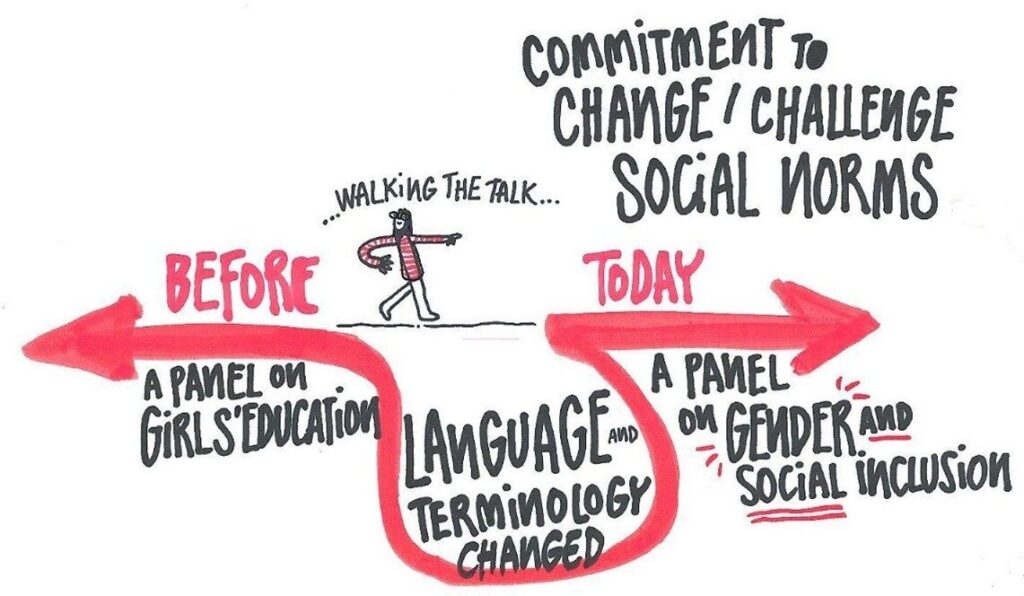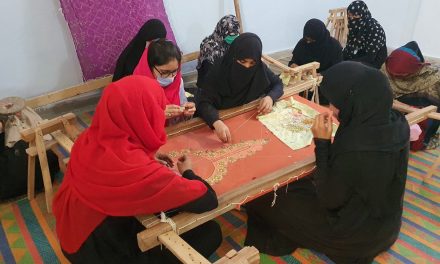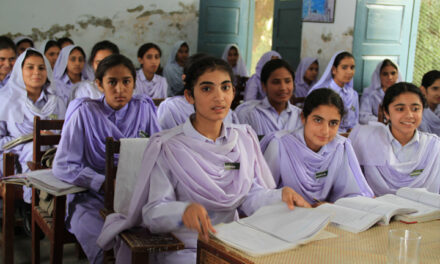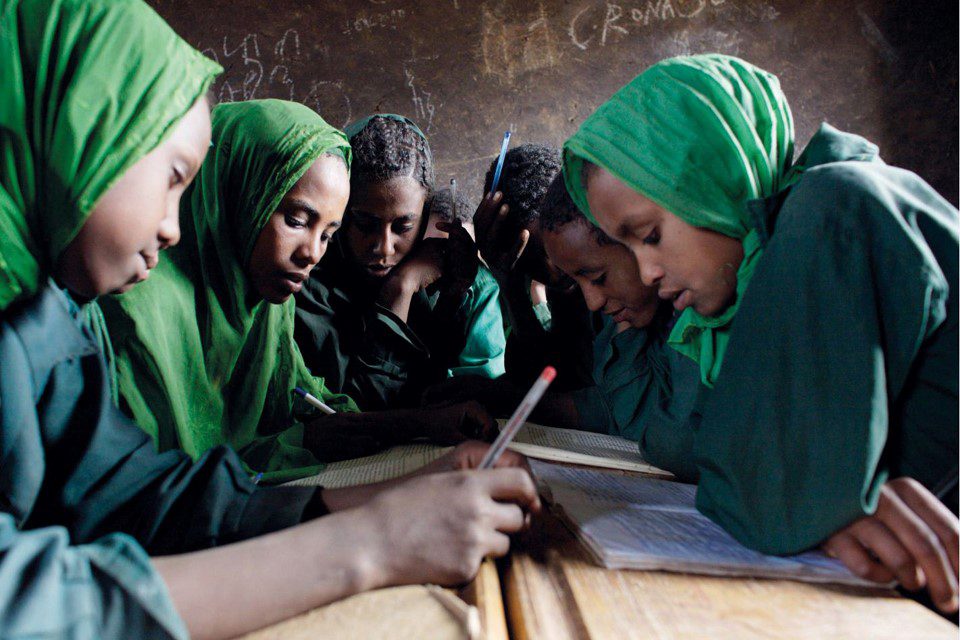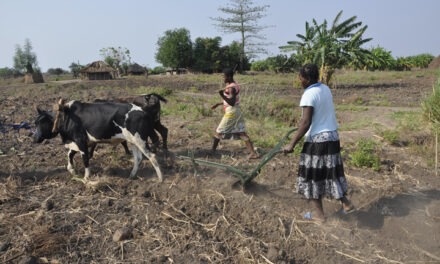This blog was written by Dr Amna Ansari, Research Associate, REAL Centre, University of Cambridge.
In June 2025, the Research for Equitable Access and Learning (REAL) Centre celebrated ten years of relentless research on tackling injustices in and through education. In the words of Director Professor Pauline Rose, lying at the heart of this mission has been an unwavering commitment to advancing gender equity and social inclusion. Evidence generated by the REAL Centre has particularly emphasised the critical role of challenging restrictive social norms that perpetuate educational disparities for girls and other marginalised groups. At their 10th anniversary conference, the REAL community convened to reflect on global shifts and their own contributions to gender equity and social inclusion in the past decade, as well as priorities for driving future change.
You can watch the panel discussion here:
Changes in the past decade
Advocates of gender equity and social inclusion have much to celebrate from the past decade, though recent funding cuts for girls’ education threaten to undermine these hard-won gains. In recent years, evidence such as the Gender Social Norms Index has increasingly suggested that addressing gender and social inclusion is essential to advancing the broader human development agenda. This has called attention to social norms or the roles and power relations between men and women in society that are continuing inequalities in education and broader dimensions of people’s lives. Realising the need for change, the global educational landscape has shifted to nudge actors such as governments, policymakers, development partners, practitioners and civil society organisations towards a more equitable and inclusive world.
As Sara Ruto, Program Officer at Echidna Giving, remarked at the conference, greater attention to these issues has yielded “a number of beautiful gains in policy, such as curricular reforms in Kenya, East Africa, covering life skills and other issues for girls and boys that wouldn’t have been covered before.” Beyond education, there has also been increasing emphasis on supporting girls’ and young women’s transitions into employment, fostering their leadership and agency, and expanding their access to a wide range of opportunities and benefits.
How has the REAL Centre contributed to this change?
The REAL Centre’s rigorous evidence has enabled such social transformation for gender equity and social inclusion by establishing both what needs to be done, and how. For policymakers who are looking to use data and evidence to inform their decision-making, Sally Gear, Practice Lead, Gender Equality and Inclusion, Global Partnership for Education, and previously at FCDO, terms this an achievement worth celebrating. For instance, REAL’s research on several independent evaluation studies of the FCDO-funded Girls’ Education Challenge has consistently shown how community attitudes and norms are a key barrier limiting girls’ and boys’ enrolment, attendance, and progress in school, and thus need changing. It has also presented clear evidence on the change pathways that can help shift social norms towards more equitable and inclusive education, and enable sustained change.
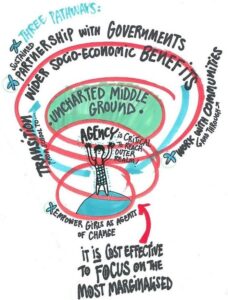 This includes engaging with communities and local and national governments, as well as empowering young women as change agents themselves. Lucy Lake, former CEO at the Campaign for Female Education (CAMFED) and currently Director of Global Engagement, Yidan Prize Foundation, described how such evidence from the REAL Centre, in partnership with CAMFED, is already translating into transformative action in Tanzania, where the Ministry of Education is exploring factors that can be embedded within the system to shift gender social norms in the long term. Moreover, REAL evidence generated through their work with CAMFED has also demonstrated that it is cost effective to reach the most marginalised. As Lucy Lake remarked, this means that “if you do focus on the most marginalised, it will result in an uplift for all children.” The Centre also continues to generate important lessons for ongoing and future education programming through its work on scaling and sustainability of educational interventions. In the words of Sally Gear, “the world is a better place as the REAL Centre is here, because of its impact on education, research, policy and, most importantly, practice, which REAL gets right.”
This includes engaging with communities and local and national governments, as well as empowering young women as change agents themselves. Lucy Lake, former CEO at the Campaign for Female Education (CAMFED) and currently Director of Global Engagement, Yidan Prize Foundation, described how such evidence from the REAL Centre, in partnership with CAMFED, is already translating into transformative action in Tanzania, where the Ministry of Education is exploring factors that can be embedded within the system to shift gender social norms in the long term. Moreover, REAL evidence generated through their work with CAMFED has also demonstrated that it is cost effective to reach the most marginalised. As Lucy Lake remarked, this means that “if you do focus on the most marginalised, it will result in an uplift for all children.” The Centre also continues to generate important lessons for ongoing and future education programming through its work on scaling and sustainability of educational interventions. In the words of Sally Gear, “the world is a better place as the REAL Centre is here, because of its impact on education, research, policy and, most importantly, practice, which REAL gets right.”
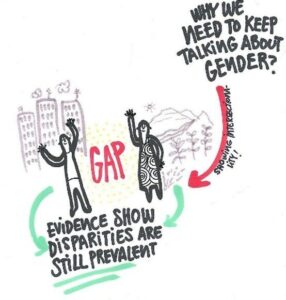 But how does the REAL Centre “get it right” and what sets it apart? Technical experts and panellists at the conference commended the Centre for remaining true to what have been its core values, such as ensuring rigour in research, working in partnership and collaboration with others, and ensuring impact. As Sara Ruto observed, the REAL Centre’s “veracity, collaboration – not just evidence but friendship – has allowed knowledge to grow and evidence to be produced in a way that it can be used.”
But how does the REAL Centre “get it right” and what sets it apart? Technical experts and panellists at the conference commended the Centre for remaining true to what have been its core values, such as ensuring rigour in research, working in partnership and collaboration with others, and ensuring impact. As Sara Ruto observed, the REAL Centre’s “veracity, collaboration – not just evidence but friendship – has allowed knowledge to grow and evidence to be produced in a way that it can be used.”
Where do we go next?
The debates and discussions at the REAL Centre’s 10th anniversary conference have made one thing clear: addressing social norms to advance gender equity and social inclusion is a global challenge, requiring continued advocacy and what Lucy Lake termed, ‘relentless rigour in research on the levers for persistent change to give us the drivers and policy to get there.’ This underscores the importance of becoming more intentional in our generation and use of data for decision-making – for example, disaggregating it by sex, disability and other markers of marginalisation at sub-national levels as well as using simple yet powerful representations, which Sally Gear mentioned could be a game changer for policymakers – but also winning people’s hearts and minds for steady and sustained progress. As Sara Ruto stated, “we need to find ways of using research and evidence but also seeing ourselves how we can build a movement to build a better society.”
Going forward, putting our learning into practice will also require becoming more practical about social norms, assessing their linkages within education as well as with other sectors and wider social contexts. For instance, countries’ efforts on improving foundational learning will need to be inseparable from influencing harmful practices such as gender-based violence in schools, which can impede children’s learning through feelings of fear and lack of safety. Similarly, drawing on indigenous systems, knowledge, culture and, quite simply, language, will be imperative in adopting ‘a more human approach’ in winning the fight for an equitable and inclusive world that ensures fairness for everyone. This involves using less jargon when we talk about equity and inclusion, paying close attention to how our words translate into local languages, and the messages they convey to different stakeholders.
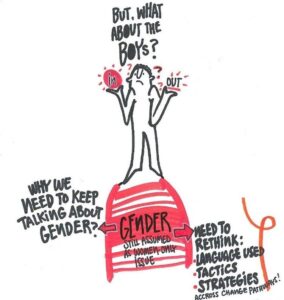 For instance, while it may seem like the boys are put in what Lucy Lake described as “a cold, hard box” in following a girls’ agenda, it is important to remember that “girls are succeeding despite the odds stacked against them, not because the system was designed for them.” Put another way by Sara Ruto, the question about boys “should not be taking away from what is still a fruitful conversation to follow. That is why, in certain areas, we need to look at the girls – they are faced with patriarchy, culture and their own physiological makeup that makes them more vulnerable.” At the same time, we need to intensify our efforts to actively include men and boys in overcoming the barriers to girls’ education, recognising, as Sally Gear cautions, that this is not a “zero-sum game” but an opportunity for collective progress. As Lucy Lake articulated, “It is not about inclusion in systems, rather, systems need to ensure all children are served – if they serve the most marginalised, they will serve all. That is the line of sight we should have.”
For instance, while it may seem like the boys are put in what Lucy Lake described as “a cold, hard box” in following a girls’ agenda, it is important to remember that “girls are succeeding despite the odds stacked against them, not because the system was designed for them.” Put another way by Sara Ruto, the question about boys “should not be taking away from what is still a fruitful conversation to follow. That is why, in certain areas, we need to look at the girls – they are faced with patriarchy, culture and their own physiological makeup that makes them more vulnerable.” At the same time, we need to intensify our efforts to actively include men and boys in overcoming the barriers to girls’ education, recognising, as Sally Gear cautions, that this is not a “zero-sum game” but an opportunity for collective progress. As Lucy Lake articulated, “It is not about inclusion in systems, rather, systems need to ensure all children are served – if they serve the most marginalised, they will serve all. That is the line of sight we should have.”
But what will it take to realise this ambitious agenda? As Sally Gear’s words aptly marked the occasion, “At least 10 more years of the REAL Centre, please!”
—–
This blog is part of a series unpicking issues discussed at the REAL Centre 10-year anniversary conference in June 2025. Others in the series include:
A decade of learning, a future of inclusion: The REAL Centre’s journey
The role of education in decolonisation, climate and conflict: A call to action
Advancing inclusive education: Moving beyond tokenism
Elevating teachers’ voices to support equitable learning
“Where next?” Navigating a future for education and international development amid funding cuts

